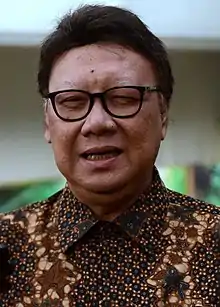Tjahjo Kumolo
Tjahjo Kumolo (born 1 December 1957) is an Indonesian politician and the currently-appointed Minister of Administrative and Bureaucratic Reform.[1] He previously served as Minister of Home Affairs in President Joko Widodo's 2014-2019 Working Cabinet.
Tjahjo Kumolo | |
|---|---|
 | |
| 28th Minister of Home Affairs | |
| In office 27 October 2014 – 18 October 2019 | |
| President | Joko Widodo |
| Vice President | Ma'ruf Amin |
| Preceded by | Gamawan Fauzi |
| Succeeded by | Tito Karnavian |
| Member of People's Representative Council | |
| In office 1 October 1999 – 1 October 2014 | |
| In office 1 October 1987 – 31 September 1997 | |
| President | Suharto Abdurrahman Wahid Megawati Soekarnoputri Susilo Bambang Yudhoyono |
| Secretary General of PDI-P | |
| In office 8 April 2010 – 10 April 2015 | |
| Preceded by | Pramono Anung |
| Succeeded by | Hasto Kristiyanto |
| Personal details | |
| Born | December 1, 1957 Surakarta, Indonesia |
| Nationality | Indonesia |
| Political party | PDI-P |
| Spouse(s) | Erni Guntarti |
| Alma mater | Diponegoro University National Defense Body |
He is a longtime loyalist of former president Megawati Sukarnoputri and a senior member of her Indonesian Democratic Party of Struggle (PDI-P).[2] He was Secretary General of PDI-P between 2010 and 2015, and was a member of the People's Representative Council (DPR) between 1999 and 2014 during which time he was the speaker of his party's faction until his replacement by later fellow minister Puan Maharani. During the New Order regime of former president Suharto, he served two terms in the DPR between 1987 and 1997.
Personal life
Early life and education
Kumolo was born in Surakarta (often referred to as Solo) on 1 December 1957. He attended school for 12 years in the larger city of Semarang and lived in the Mlatiharjo administrative village (kelurahan) on the eastern side of the city.[3] His father, Bambang Soebandiono, was a lieutenant in the Indonesian Army.[4] Both his father and his mother Toeti Slemoon had at some point sat in the People's Representative Council, the former having served five terms.[5]
After graduating from high school, he studied law at Diponegoro University, graduating in 1985. During this period, he was elected leader of KNPI's (National Committee of Indonesian Youth) Central Java chapter. He also studied at the National Defense Body until 1994.[6]
Family
He married Erni Guntarti and the couple has three children. His wife and first children are both doctors, with his second child working as an actress and the third as a flight attendant.[7]
Career
Prior to his tenure for the KNPI, he had worked as a reporter for a daily paper in Central Java. Kumolo first became a member of the People's Representative Council in 1985, which necessitated him to move to Jakarta.[5] Initially he was a member of Golkar, and had worked in the second and third commissions of the parliament in addition to the interparliamentary partnership body (BKSAP). Following the fall of Suharto, he moved to PDI-P and was elected back into the parliament in 1999. In this term, he acted as deputy speaker of the faction until 2002, followed by being a faction secretary until 2003.[7]
He ran once more in the 2004 elections and remained in the parliament, this time as the speaker of the PDI-P faction until another election in 2009, when he once more secured his seat. He was also chosen as the Secretary General of PDI-P in 2010 by party leader Megawati Soekarnoputri.[8] Later, his faction speaker position would be taken in 2012 by Puan Maharani and his secretary general position in 2015 by Hasto Kristiyanto.[9][10]
Following Joko Widodo's election victory over Prabowo Subianto in 2014, he was selected as Minister of Home Affairs in the Working Cabinet and was officially sworn in on 27 October 2014.[11]
During the blasphemy accusations against Basuki Tjahaja Purnama in 2017, Kumolo refused to suspend the Chinese Indonesian governor of Jakarta.[12] Later in the same year, he disbanded the Indonesian branch of Hizbut Tahrir.[13]
References
- "Tjahjo Kumolo dari Mendagri Kini Menpan Reformasi Birokrasi" [Tjahjo Kumolo from becoming the Home minister now becomes the Administrative and Bureaucratic Reform minister]. Tempo. 23 October 2019. Retrieved 23 October 2019.
- Nugroho, Johannes (19 July 2015). "Jokowi to blame for Cabinet's lack of collective responsibility". Malay Mail Online. Retrieved 14 April 2018.
- Ferri, Oscar (9 December 2015). "Mengintip Rumah Masa Kecil Menteri Tjahjo di Semarang". Liputan6 (in Indonesian). Retrieved 7 November 2017.
- Paath, Carlos KY (12 November 2016). "Mendagri Ziarah ke Makam Orangtua di Semarang" (in Indonesian). Berita Satu. Retrieved 7 November 2017.
- Supriyatna, Agus (16 August 2017). "Cerita Menteri Tjahjo, Patahkan Rekor Sang Ayah". Kumparan. Retrieved 7 November 2017.
- "Tjahjo Kumolo" (in Indonesian). Merdeka. Retrieved 7 November 2017.
- Putra, Putu Merta Surya (28 October 2014). "Cerita Keluarga Mendagri Tjahjo Kumolo" (in Indonesian). Detik. Retrieved 7 November 2017.
- "Tjahjo Kumolo, Sekjen Baru PDI-P". KOMPAS.com (in Indonesian). 8 April 2010. Retrieved 7 November 2017.
- Ningtyas, Ika (10 April 2015). "Megawati Tunjuk Hasto Kristiyanto Jadi Sekjen PDIP". Tempo (in Indonesian). Retrieved 7 November 2017.
- Siregar, Dimas (23 January 2012). "Puan Gantikan Tjahjo sebagai Ketua Fraksi PDIP". Tempo (in Indonesian). Retrieved 7 November 2017.
- "New home minister to delve into minority issues". The Jakarta Post. 28 October 2014. Retrieved 7 November 2017.
- Aritonang, Margareth S. (22 February 2017). "Tjahjo Kumolo remains firm on decision not to suspend Ahok". The Jakarta Post. Retrieved 7 November 2017.
- "Govt plans to ban other 'anti-Pancasila' groups". The Jakarta Post. 10 August 2017. Retrieved 7 November 2017.